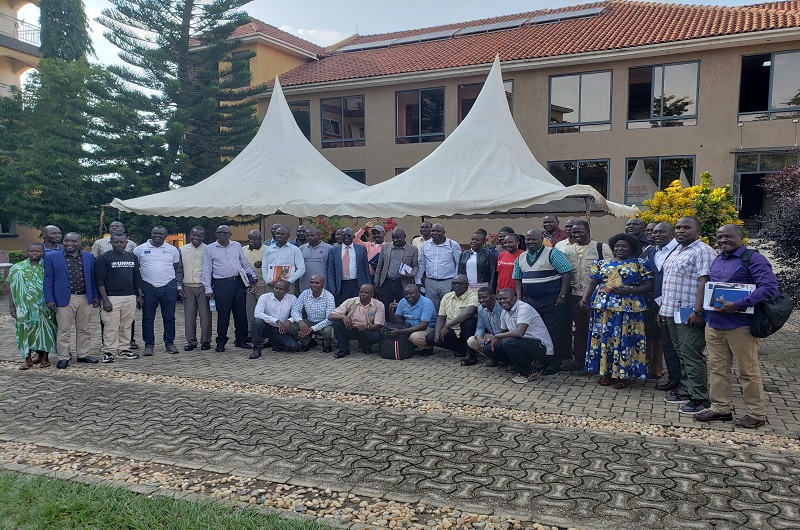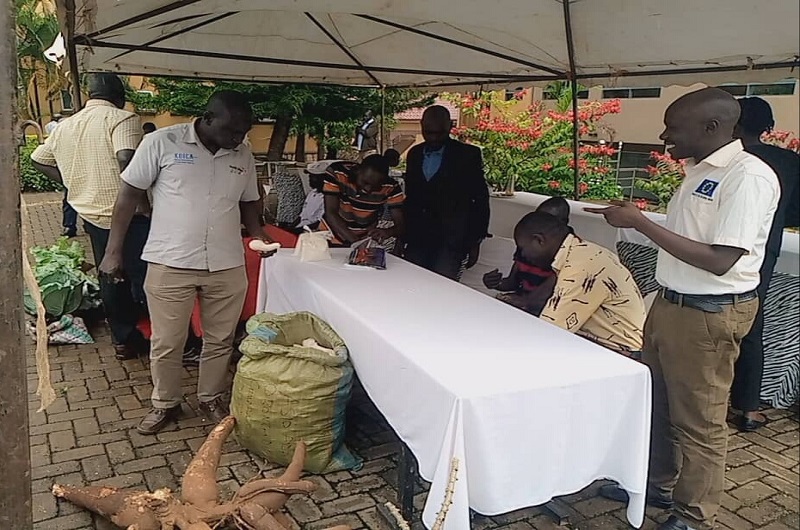Over 27,000 Locals, Refugees Benefit From EU Funded Project

The stakeholders pose for a group photo shortly after the project closure engagement meeting on Wednesday Photo Credit Andrew Cohen Amvesi
ARUA. A total of 27,372 refugees and their host communities in the West Nile sub-region have benefited from a European Union (EU) funded project.
Of the beneficiaries, at least 2,000 youths got trained in vocational skills and they are now earning a living from the knowledge attained.
The four-year project dubbed, ‘Security, Protection and Economic Empowerment (SUPREME)’ project, was implemented by World Vision in consortium with SNV, ZOA and RICE – West Nile in refugee hosting districts of Terego, Madi Okollo, Obongi and Moyo.
It was aimed at delivering improved overall economic well-being for refugees and host communities in the selected districts.
Speaking during the final closure stakeholders’ engagement meeting in Arua City on Wednesday, July 24, 2024, Noel Alabi, the World Vision Program Manager for the SUPREME project, said the project reached out to 27,372 direct participants organized in 1,000 groups, 2000 youths trained in vocational skills and engaged 50 private sector entities delivering market linkages, amplifying its reach and impact.
He observed that each group was given 1,000 Euros (about Shs4,052,000) to supplement their savings while a total of 764 beneficiaries were supported with grants to undertake different enterprises.
“The intervention had a great impact in the lives of refugees and host communities. This has given opportunity for members to access affordable credits through their savings and development clusters to support their families. Secondly, families have been able to invest this finance into businesses and these businesses have been very key in transforming the lives of families especially by strengthening their resilience,” Alabi said.
“The opportunity to run a business makes the beneficiaries, especially the refugees, to be able to earn some shillings every day and that has given a lot of hope for them because previously, most of them didn’t have anything to depend on. The kind of project participants that we selected were the most vulnerable and one of the vulnerability factor we considered is people who don’t have an income source and I can say this has been able to fit in that space,” Alabi explained.
Adam Asio, one of the beneficiaries from Gimara Sub-County in Obongi district testified that he was able to receive a grant of shs7m from the project and invested it in cassava growing, which over the years, has made him shs90m richer.
“Before the coming of the SUPREME project in 2020, I used to only plant 5 acres of cassava mainly for consumption but when I got a grant from the project, I first planted 10 acres of NAROCAS1 cassava and I got 68 bags. When I sold the cassava, I was able to get shs18m. I returned the shs10m in the field and increased my acreage of cassava to 28 and I used the balance of the money to diversify the enterprise by opening a merchandise shop in Obongi town,” Asio said.

Asio noted that from the 28 acres of cassava this time round in 2023, he was able to harvest 150 bags and got shs90m.
“I have used part of the money to now plant 34 acres of cassava. I also opened another shop in Adjumani district where I sell both merchandise and cassava in the form of flour. I can now feed my family very well without any problem when it comes to food. Besides, I have taken my own child to Kampala to do Bachelors in Agriculture while the other one is doing Certificate in Nursing at Moyo Nursing school. So, I must say that my life has been made better through the SUPREME project,” Asio said.
Esther Kule, another beneficiary from Lefori Sub-County in Moyo district, said the knowledge she got from the SUPREME project enabled her to start venturing in poultry farming.
Kule who got funding from the project said she started with 300 chicks on October 8, 2020 which she kept selling overtime and used the money to support her family.
She said since then, she has sold over 4,000 chicken, and used the money for paying school fees and feeding her family.
“Diet is now not a problem at my home, anytime my children want to eat chicken, I just get one and slaughter for them to enjoy. When I came to the camp, life was very difficult for me but now SUPREME has made life better for me and my family. Even if the SUPREME project is ending, personally, I still feel its presence in my heart and at my home,” joyful Kule said.
Wilfred Saka, the Terego District Chairperson, commended World Vision and partners for the initiative.
“World Vision, we will really not forget you for the good work you have done in this region together with other partners. Keep empowering our people. Empowering the community to do this is sorting out a range of problems; dietary and so on. A well-fed person is a solution to so many things; is able to send children to school with this, is able to defy all odds and will never fall sick because most of the cases of sickness today are nutritional in nature,” Saka said.
In her closing remarks, Jena Toma, the Deputy Refugee Desk Officer in the Office of the Prime Minister (OPM) – West Nile, urged the European Union to continue funding similar projects in the region.
“I really want to thank the EU community for this funding. It is again our humble request that as this project is concluding, the project should be able to open another avenue for a similar project because the refugees are not about to go,” Toma stated.